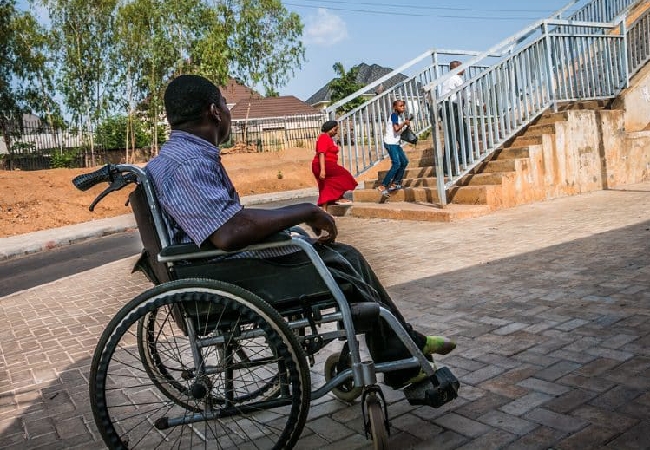The National Commission for Persons with Disabilities (NCPWD) has revealed that 75 per cent of students with disabilities in Nigerian universities experience stigma, discrimination, or social exclusion
In Nigerian universities, the pursuit of knowledge and academic excellence is often hindered by a more insidious challenge, the systemic marginalization of students with disabilities. Despite efforts to promote inclusivity, students with disabilities continue to face formidable barriers that threaten their right to education. From crumbling infrastructure to inadequate support services, the obstacles are manifold.
Students’ Experiences
Muhyideen Adebayo, a student of Computer science, University of Ibadan with sight issue said “During lectures, I am unable to see what is written on the board or projected from even the front row seats. I either rely on my friends or use my phone’s camera as a magnifier.
“There’s also the issue of the illumination of the lecture halls. A level of illumination (even with artificial lighting) that is considered appropriate is most often not enough for me. I usually use a flashlight to help, even during exams,” he said
He added that his passion and field of study also adds to the dynamics. He had people tell him “People like you should study special education.
“The government should help in supporting students with disabilities by providing assistive technology to ensure equal access to education, offering scholarships to alleviate the financial burdens associated with disability education, and training lecturers to create an inclusive learning environment,” Muhyideen pleaded.
Musa Baba Aliyu Yusuf, a 300 level student of veterinary medicine, Usmanu Danfodiyo University with physical disability (crippled) told Naomisophyblog that “for someone with a physical disability, it’s a constant source of distress. I often feel sad and discouraged before lectures, knowing I will have to tackle the stairs again. It’s disheartening that the university doesn’t seem to consider the needs of students with disabilities in its design and planning”, he lamented
Inadequate infrastructure and facilities
A 2023 report by the NCPWD found that 85% of schools in Nigeria are not accessible for students with disabilities
Students with physical disabilities navigate treacherous terrain, confronting stairs, uneven pavements, and inaccessible facilities. Those with visual impairments struggle to access materials, relying on makeshift solutions or assistance from peers.
READ ALSO:FEATURE: As graduates increase yearly and jobs dwindle, here’s one way to solve the problem
Meanwhile, students with hearing impairments face isolation, unable to fully participate in lectures or discussions. Learning disabilities and mental health concerns often go undiagnosed or unsupported, leaving students to flounder in silence.
Insufficiently trained staff
A search on the Disability Right Advocacy center shows that 80% of university staff in Nigeria did not receive training on disability awareness, support or inclusive education.
The lack of trained staff is a significant barrier to providing effective support for students with disabilities in educational institutions. Despite the best intentions, untrained staff can unintentionally create a hostile learning environment, leading to poor academic outcomes, frustration, and marginalization.
Expert weighs in
Prof. Halimah Sarkinfada, disability inclusion expert, acknowledged that, people with disabilities often encounter numerous challenges in society, struggling to access essential aspects of life such as education, employment, social events, and basic amenities. Despite inclusive policies aimed at promoting acceptance, they are frequently relegated to special schools rather than being integrated into the mainstream education system.
She noted that it’s crucial that to absorb them into normal schools, allowing them to socialize and recognize themselves as valued members of society, rather than feeling secluded and marginalized.
“Individuals with physical disabilities often encounter barriers to accessing essential academic facilities, including lecture halls, lecturer offices, and examination offices, due to the lack of wheelchair-friendly infrastructure. Moreover, the absence of accommodations for students with sensory impairments, such as braille or tactile materials for the blind, sign language interpreters or audio descriptions for the deaf, and alternative communication methods for those who are unable to speak, hinders their ability to acquire knowledge and fully participate in academic life.
“The government should provide universities with the necessary facilities to effectively implement inclusive policies, ensuring that all amenities available in special schools are also accessible in higher education institutions.
“This will enable students with disabilities to transition from secluded education to inclusive learning environments, fostering greater interaction and understanding. By implementing inclusive policies and providing supportive infrastructure, universities can create a more conducive and damage-free environment, promoting equal opportunities and empowerment for people with disabilities”, she added.
By Hamid Fatimah Omotayo
The post FEATURE: Students living with disabilities left to suffer appeared first on Latest Nigeria News | Top Stories from Naomisophyblog.

